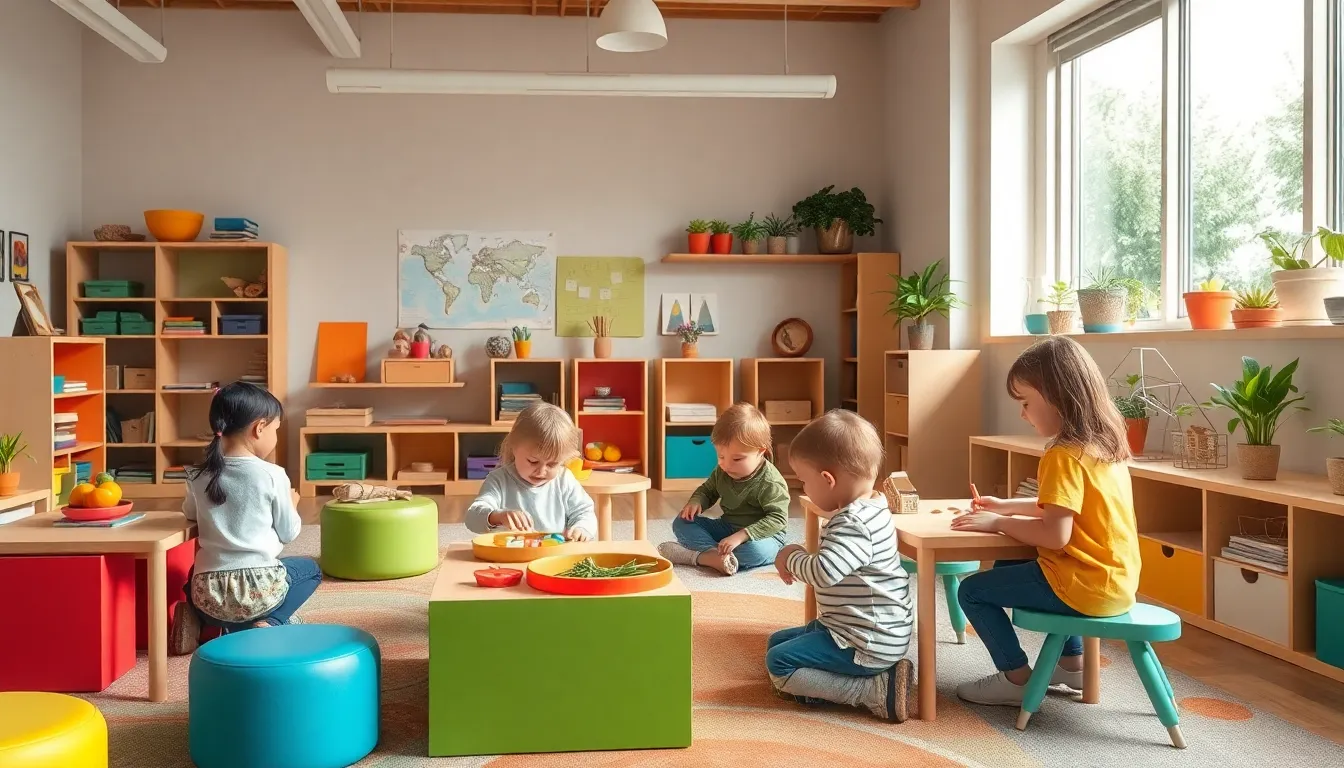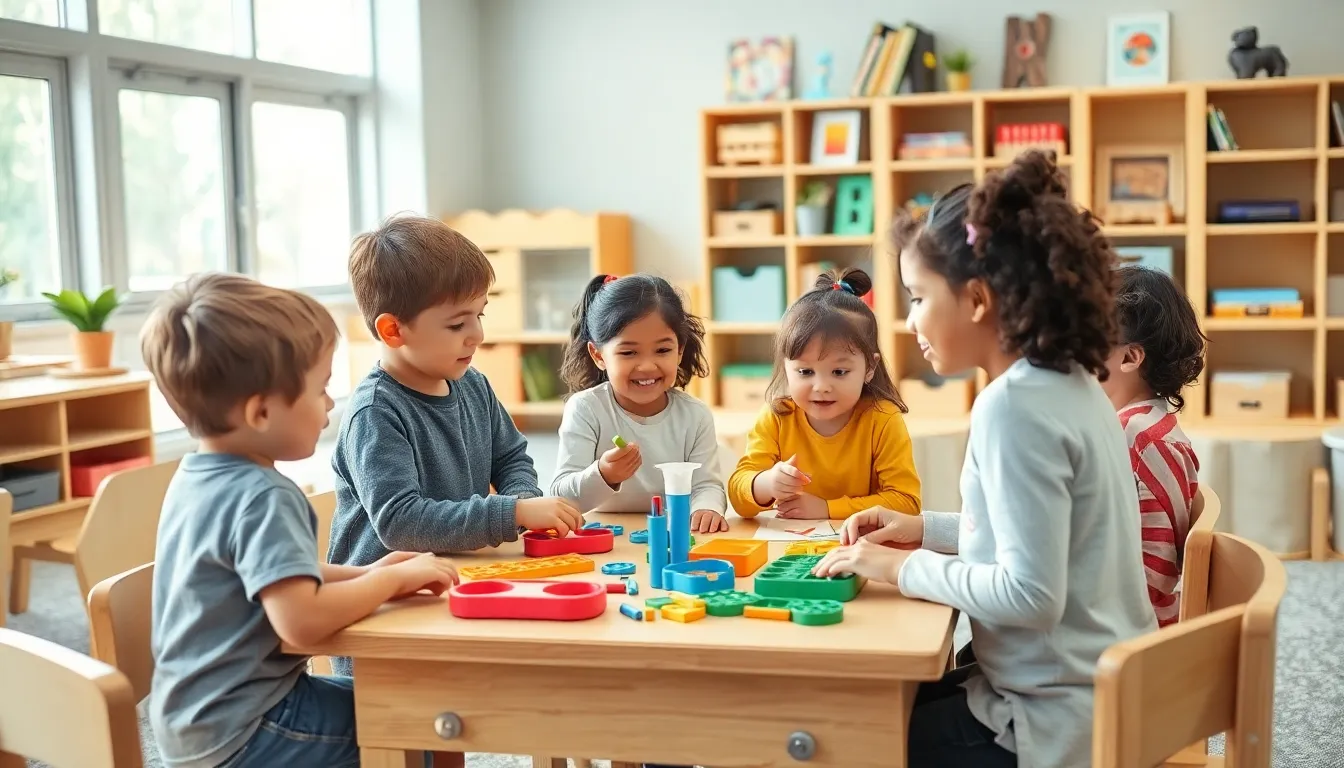Table of Contents
ToggleImagine a classroom where kids aren’t just sitting at their desks, but instead are exploring, creating, and learning at their own pace. Welcome to the world of Montessori elementary schools, where education feels less like a chore and more like an adventure. Here, children engage in hands-on activities that spark their curiosity and foster independence.
In a Montessori setting, it’s not just about reading, writing, and arithmetic; it’s about developing a love for learning that lasts a lifetime. With mixed-age classrooms and a focus on collaboration, students learn from one another, sharing knowledge like pros. So if you’re seeking an educational approach that encourages creativity, critical thinking, and a sprinkle of fun, Montessori might just be the perfect fit for your little explorer.
Overview of Montessori Elementary School
Montessori elementary schools offer a unique educational experience that emphasizes hands-on learning and self-directed exploration. Students engage with a wide variety of subjects, including language, mathematics, science, and the arts, through projects that pique their interests. This method promotes a love for learning by allowing children to discover knowledge at their own pace.
Collaboration thrives in mixed-age classrooms, where younger students learn from their older peers, fostering mentorship. Each child is encouraged to share their insights and ideas, enhancing critical thinking skills. As a result, the classroom atmosphere nurtures creativity and connection among students.
Assessment in Montessori elementary schools differs from traditional methods. Educators observe students’ progress regularly and provide personalized feedback, guiding their educational journey without the pressure of standardized testing. This approach respects individual learning styles and encourages intrinsic motivation, leading to a deeper understanding of concepts.
Additionally, practical life skills are integrated into the curriculum. Students participate in activities that develop independence and responsibility, such as cooking, gardening, and basic financial literacy. These experiences equip children with tools they’ll utilize beyond the classroom.
Montessori education not only cultivates academic skills but also emphasizes social development and emotional intelligence. With a focus on respect for others and collaborative problem-solving, students thrive in a supportive environment that values diversity and individual contributions. This holistic approach prepares children for future challenges, fostering a generation of innovative thinkers.
The Montessori Method Explained

The Montessori method centers on fostering a child’s natural curiosity and desire to learn. This approach encourages children to explore concepts at their own pace, which nurtures independence and love for learning.
Key Principles
Montessori education is based on key principles that guide the learning process. Respect for the child is paramount, allowing students to make choices in their learning journey. Another principle is the emphasis on experiential learning, where hands-on activities facilitate deeper understanding of concepts. Additionally, self-directed activity encourages children to take ownership of their education. Mixed-age classrooms enhance peer learning, enabling older students to mentor younger ones. This dynamic fosters collaboration and mutual respect among students.
Learning Environment
The learning environment in Montessori schools differs significantly from traditional classrooms. Classrooms are designed to be inviting and accessible, filled with materials that promote active learning. Children engage with specially crafted learning tools that cater to various subjects, aiding in skill development. Furniture is often modular, allowing easy rearrangement to accommodate different activities. Spaces are organized to facilitate collaboration and interaction, promoting a sense of community. Nature plays a role as well, with outdoor activities integrated into the curriculum, enhancing connection with the environment.
Curriculum and Activities
Montessori elementary schools emphasize a diversified curriculum and engaging activities. Students learn core subjects through exploration and discovery, which nurtures curiosity.
Core Subjects
Language studies focus on reading, writing, and expression. Students engage with literature, enhancing vocabulary and comprehension skills. Mathematics includes hands-on materials that illustrate abstract concepts, allowing for deeper understanding. Science lessons often incorporate experiments, fostering inquiry and critical thinking. Social studies encourage awareness of community and culture, promoting respect for diversity. Each subject connects seamlessly to develop a well-rounded educational experience.
Creative Learning Opportunities
Creative activities invite students to explore the arts through music, drama, and visual arts. These opportunities stimulate imagination and promote self-expression. Practical life skills, such as cooking or gardening, support responsibility and independence. Field trips enhance classroom learning by connecting concepts to real-world experiences. Collaborative projects inspire teamwork and problem-solving. Such experiences contribute to a vibrant learning environment that nurtures both intellectual and emotional growth.
Benefits of Montessori Elementary School
Montessori elementary schools offer numerous advantages that support children’s growth and development. The unique approach fosters an environment where students flourish academically and personally.
Fostering Independence
Fostering independence is a cornerstone of Montessori education. Students engage in self-directed activities that empower them to explore their interests. They choose tasks, which instills a sense of autonomy and responsibility. Materials in the classroom are designed for hands-on exploration, allowing students to learn through experience. This method cultivates problem-solving skills and critical thinking. Rather than relying on direct instruction, children become active participants in their learning journey. Over time, they build confidence in their abilities, laying the foundation for lifelong learning.
Social and Emotional Development
Social and emotional development receives strong emphasis in Montessori elementary schools. Students interact with peers of different ages, promoting collaboration and mentorship. These interactions enhance communication skills and empathy. Through group activities, children learn to appreciate diverse perspectives and work cooperatively. Additionally, a focus on conflict resolution encourages children to manage their emotions effectively. As students build strong connections, they develop a sense of community and belonging. This supportive environment nurtures emotional intelligence, which is essential for future success. Ultimately, Montessori education prepares children for societal challenges, equipping them with the skills to navigate diverse relationships.
Challenges and Criticisms
Montessori elementary schools face several challenges and criticisms, despite their innovative approach to education.
Common Misconceptions
Many observers misunderstand the Montessori method as unstructured or chaotic. Structured independence is a hallmark of this approach. Critics often believe that children lack discipline due to self-directed learning, while, in reality, children thrive under guided choice. Some also argue that the absence of standardized testing leads to gaps in knowledge, ignoring the emphasis on personalized assessment and continuous observation. Misconceptions persist that Montessori schools do not teach essential skills, despite their focus on practical life skills alongside traditional subjects.
Addressing Concerns
Concerns about the effectiveness of Montessori education center on academic rigor and social skills. Some parents worry that children may not meet grade-level expectations in a non-traditional setting. Yet, research indicates that Montessori students often outperform peers on standardized assessments. Social interaction is another concern, as critics fear mixed-age classrooms may hinder socialization. In practice, these environments promote collaborative skills and empathy, fostering strong, supportive relationships among students of different ages. Addressing these issues through community engagement and clear communication about pedagogical methods can enhance understanding and acceptance of Montessori education.
Montessori elementary schools provide an enriching environment that nurtures a child’s curiosity and independence. By emphasizing hands-on learning and collaboration, these schools cultivate critical thinking and emotional intelligence. The approach encourages students to take ownership of their education while developing essential life skills.
Despite facing misconceptions and challenges, the Montessori method has proven effective in fostering both academic and personal growth. As parents and educators continue to explore innovative educational options, Montessori schools stand out as a compelling choice for children seeking a dynamic and supportive learning experience. Embracing this unique approach can lead to a generation of confident and capable individuals ready to tackle future challenges.





